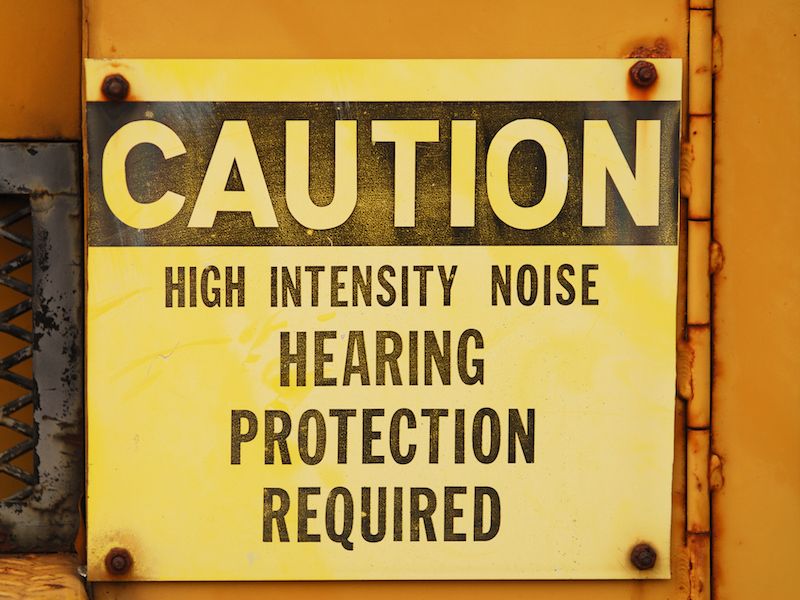
Realizing you should safeguard your hearing is one thing. It’s another matter to know when to safeguard your hearing. It’s not as easy as, for example, knowing when to wear sunscreen. (Is the sun out and will you be outdoors? Then you need sunblock.) It isn’t even as simple as determining when to use eye protection (Using a hammer? Working with a saw or hazardous chemicals? Use eye protection).
When dealing with when to use hearing protection, there seems to be a huge grey area which can be risky. Unless we have specific information that some place or activity is hazardous we tend to take the easy road which is to avoid the problem altogether.
Assessing The Risks
In general, we’re not very good at assessing risk, especially when it comes to something as intangible as lasting hearing damage or hearing loss. To prove the point, check out some examples:
- A very loud rock concert is attended by person A. 3 hours is around the length of the concert.
- A landscaping business is run by person B. After mowing lawns all day, she goes home to quietly read a book.
- Person C works in an office.
You may think the hearing hazard is higher for person A (let’s just call her Ann). For the majority of the next day, her ears will still be screeching from the loud performance. Assuming Ann’s activity was hazardous to her ears would be reasonable.
The noise that person B (let’s just call her Betty), is exposed to is not as loud. There’s no ringing in her ears. So her hearing must be less hazardous, right? Not necessarily. Because Betty is mowing every day. So even though her ears never ring out with pain, the harm accrues little by little. Even moderate sounds, if experienced regularly, can harm your ears.
What’s occurring with person C (let’s call her Chris) is even harder to sort out. Most people realize that you should safeguard your hearing while using machines such as a lawnmower. But although Chris has a fairly quiet job, her long morning commute on the train every day is rather loud. Additionally, although she works behind her desk all day, she listens to her music through earbuds. Does she need to give some thought to protection?
When is it Time to Worry About Safeguarding Your Ears?
The general guideline is that if you need to raise your voice to be heard, your environment is noisy enough to do damage to your hearing. And if your surroundings are that noisy, you really should think about using earmuffs or earplugs.
If you want to think about this a bit more clinically, you should use 85dB as your cutoff. Noises above 85dB have the ability to cause injury over time, so in those circumstances, you need to consider wearing hearing protection.
Your ears don’t have a built-in decibel meter to warn you when you get to that 85dB level, so most hearing professionals suggest obtaining specialized apps for your phone. You will be capable of taking the required steps to protect your ears because these apps will inform you when the sound is getting to a dangerous volume.
A Few Examples
Even if you do get that app and take it with you, your phone might not be with you wherever you go. So a few examples of when to protect your ears might help you formulate a good baseline. Here we go:
- Exercise: Your morning cycling class is a good example. Or maybe your evening Pilates session? Each of these examples may call for hearing protection. Those trainers who use sound systems and microphones (and loud music) to motivate you may be good for your heart rate, but all that loudness is bad for your ears.
- Operating Power Tools: You understand you will want hearing protection if you work all day in a factory. But what if you’re simply working in your garage all day? Most hearing professionals will recommend you wear hearing protection when operating power tools, even if it’s just on a hobbyist basis.
- Listening to music with earbuds. OK, this doesn’t require protection but does require care. Whether your music is playing directly into your ears, how loud it’s playing, and how long you’re listening to it are all things you should pay attention to. Think about getting headphones that cancel out outside noise so you don’t have to crank up the volume to dangerous levels.
- Residential Chores: Even mowing a lawn, as previously stated, necessitates hearing protection. Chores, such as mowing, are most likely something you don’t even think about, but they can cause hearing impairment.
- Driving & Commuting: Do you drive for Lyft or Uber? Or perhaps you’re riding a subway after waiting for a little while downtown. The noise of living in a city is bad enough for your hearing, not to mention the extra injury caused by turning up your music to drown out the city noise.
These illustrations might give you a suitable baseline. When in doubt, though, you should choose protection. In most cases, it’s better to over-protect your ears than to leave them exposed to possible injury down the road. Protect today, hear tomorrow.
